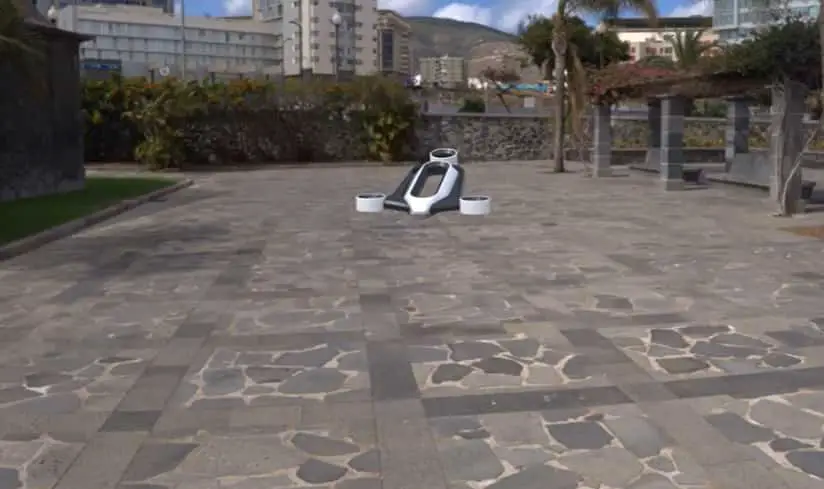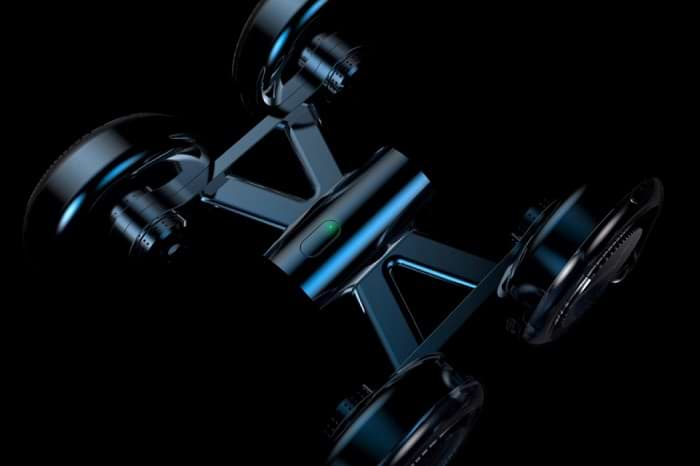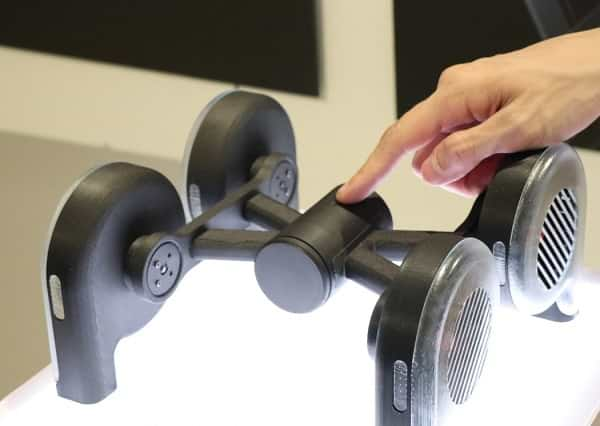
When you think of a drone, one of the first things that come to mind is the propellers that make it fly! But are they absolutely necessary to make a drone fly? I’ve done some research and here’s what I found.
Drones without propellers do exist—Marcus King, a student from the Royal College of Art in London, United Kingdom, has designed The “Impeller Drone” that uses centrifugal fans or impellers in place of axial fans. These are the type of fans you come across in leaf blowers, pulling air from the back and out of the sides.
Amazing, right? This is a major step in the innovation of drone technology and you should keep reading if you want to find out more about this drone and how it works!
The “Impeller Drone” Explained

It’s strange to think that a drone is able to fly without actually having propellers to help it take off—but just take a look at the Impeller drone!
A student from the Royal College of Art, Marcus King, has designed a drone that uses another way to get the drone off the ground. King’s drone uses centrifugal fans, otherwise known as impellers, rather than using axial fans.
Marcus decided to design this drone when looking at all the dangers of flying a drone and how it can be of harm to the pilot and the people around the drone.
He wanted to optimize the safety for both the drone pilots and the people who may be nearby at the time. The drone is still in its development stages so there is still a lot of time before it is able to be compared to some of the mainstream drones out there.
How the impeller drone works.
The drone works similar to a leaf blower but instead of air being pulled from the back and out the front but instead, the air is pulled in from the side and pushed downwards—this is possible thanks to a design that redirects the air towards the ground in order for the drone to take off.
The cover on the impeller protects it from any objects that might be pulled in and that are able to damage it, ensuring that the drone has a safe flight.
Designed to be a lot safer.
Marcus clearly noticed the dangers that most people tend to ignore about drones. drone propellers can be very dangerous at times, anything can go wrong at any moment and when that does happen, there is nothing protecting the people around the drone.

Propellers have caused many drone-related injuries over the years. Pilots have had their hands and fingers sliced by propellers while trying to pick them up after they have landed or from getting to close while they are hovering.
A child was sent to the emergency room for getting to close to a hovering drone and slicing open his eye. Clearly drones are way more dangerous than we think.
Not only is this drone design way better than any current design because it is safer for the people around the drone but it is also safer for the drone itself.
Drone enthusiasts spend hundreds of dollars replacing propellers and various parts of their drones every year due to collisions. The advantages of the impeller design are that it keeps the drone safe from object collision and the damage it may cause to important drone components.
This design also would be far safer for professional drone pilots as well. People that use drones to film Hollywood movies and people that use drones to film concerts, they have to be way more careful when flying their drone of choice because there are people around them at all times. With the impeller drone, they won’t have to be as careful and can focus more on the shot they are trying to get.
The impeller drone is also able to fly higher with less power needed to achieve this because the air is pushed forcibly through the duct. This, unfortunately, makes the impeller drone a lot more noisy than the average drone but that is something you will have to sacrifice for safety and power.
The “Bladeless Drone” Explained
The name of this drone basically describes the design perfectly. The bladeless drone ditches the common use of bladed propellers for flight but instead uses air ducts.
Designed by. The drone was designed by Edgar Herrera and he won a Red Dot Design Concept Award back in 2017 for the design.
The drone was featured in Yanko Design. The bladeless drone is a design that closely resembles a Dyson fan, hence the nickname it has received, “the Dyson of drones”.
How the blade-less drone works.
The design features bladeless propellers, the main one being smack dab in the middle of the drone. Most of the airflow through this duct and it supports most of the taking off and landing responsibilities.
The other 3 propellers surrounding the central hub are there to control the direction and movement of the drone.
The drone has 4 intake valves that collect air while it is flying. It takes that same air and accelerates it via internal ducts which force the air through ducts that are pointed towards the ground which creates lift.
Edgar’s design is not as simple as you may think, the design will also require for every bladeless propeller would have to be programmed to output power based on the amount of headwind each one would receive.
When it is on the ground due to the lack of wind when stationary, the drone’s propellers would work at full power and suck air from the intake valves and accelerating that air pushing it downwards in order to achieve flight.
When the drone is in the air, depending on the strength of the wind, the propellers will regulate themselves in order to save power and rather channel the available wind.
This drone has not yet been put into production and is still only a concept design, but when and if they are able to produce a drone such as this based off of Edgar’s designs, it would be a huge leap in the right direction for the innovation of drones.
Drawbacks To Drones Not Having Propellers
Even though drones that do not have propellers would be a much safer option for people to fly both in the professional industry and for regular hobbyists, there are a few drawbacks to having a drone that uses the impeller method or ducts.
Firstly, the amount of energy expended to provide enough airflow over an area that size would mean that you would have really short flight times, and that is only assuming the drone got off the ground in the first place—I think this is the main reason why the ducted fan drones are only still a concept.
The Impeller drone created by Marcus King is a more viable method of creating future drones but the few setbacks it might have are power and noise.
Power: The amount of power that would be needed to get the drone off the ground would be huge just like the ducted fan drones which would mean it needs larger batteries to opperate.
Noise: The Impeller drone will be very loud. If we think about how a leaf blower or hair dryer works, the Impeller drone works the same way and those are very loud machines.
To find out more about the science behind drones without propellers, check out this super interesting clip:
Final Thoughts
If you are a drone enthusiast like myself you will love drones and flying them regardless of the danger. It is important that as enthusiasts we put the safety of those around us above the enjoyment we might have of flying our drones.
When these designs are fully completed and these drones without blades are going to be a huge success and a giant step in the right direction for the droning community.
This will lead to more than just more drones being developed but this can also lead to laws being changed due to drones being safer to use!
